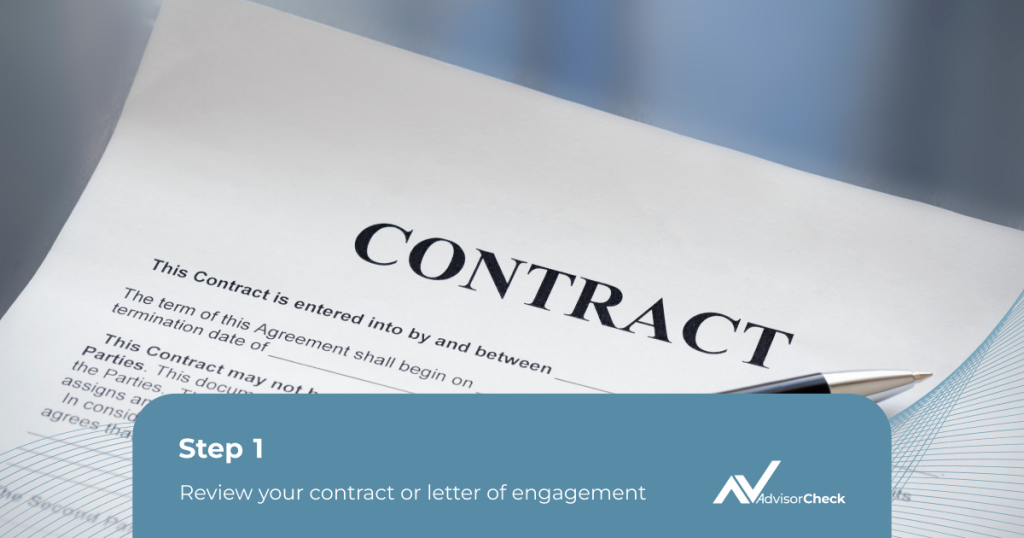
Financial Advisor
How Do I Fire My Financial Advisor?
We are in the spotlight












Sometimes a situation arises in your relationship with your financial advisor that may make you want to move on from the relationship and leave it in your past. So how do you go about firing your financial advisor? Working with a financial expert doesn’t always go as planned. Sometimes, there are great upsides and you are able to see your dreams actualize when your financial advisor makes the right plays in the market. Other times, you may feel like there are reasons you may want to part ways from your advisor and set yourself down a different path. Working with an advisor can be disappointing and aggravating if you find that the quality of their work is not consistently meeting your expectations. Whether it’s because they communicate poorly with you, you feel they are not prioritizing your interests as a client, they committed some sort of fraud or scam against you or some other reason entirely, recognizing that you need to fire your financial advisor can be a challenging and disheartening process. Dealing with the question of how to fire them can be even more difficult. To help you respond appropriately to this challenge (and, ideally, move forward with a financial advisor who’s a better fit), we will review the steps involved in firing your financial advisor. We will describe each of these steps in detail, to make sure you don’t end up overlooking any key parts of the process: Before we get into the nitty gritty of how to fire your financial advisor, we’ll start off with some honest advice about making the decision to do so. We would strongly advise that you never fire your financial advisor on a whim, especially not in response to a sense of panic about your financial situation. A state of panic is the absolute worst mindset from which to make sound financial decisions. If you’re looking at the market and noticing that your investments aren’t doing as well as you’d like, you might want to start working with someone different to see if that could improve things. But keep in mind that the state of the market isn’t a logical reason to blame your advisor and choose to stop working with them, unless you can actually attribute your investments’ poor performance to any of their decisions. For instance, those of us with 401(k)s have mostly been pretty disappointed by their performance over the last two years. With this being the case, your advisor is probably going to experience similar types of losses, but if the loss isn’t exponential, it might be smart to simply stick with the same advisor – in this situation it’s very likely that their advice isn’t the root of the problem, but rather the current behavior of the market. With inflation rates especially high, a difficult year for investors in 2022 and the possibility of a recession looming in 2023 due to the interest rate policies of the Federal Reserve, it can be tempting to act rashly and try to respond to the situation by taking action. But that’s really the last thing smart investors should be doing right now. “Most financial advisors will tell you to stay the course, as many retirement accounts have been down for the past two years, and the market has not traded with the same volume it once did in the years prior to this economic downturn,” says Leonard Kim at AdvisorCheck. “You will not want to ruin a perfectly healthy relationship with your existing financial advisor just due to a few losses – of which they will more than likely be able to recover – unless the situations are more dire, such as they’re dodging your calls, blowing you off, or minimizing your level of priority to them as a client.” Instead, you should try to remain calm and assess the situation logically. Looking back, you probably chose to work with the advisor you’re working with with good reason – most of the time, firing an advisor tends to be a last resort. There are plenty of legitimate and justifiable reasons why you might decide that you no longer want to work with a financial advisor: Here are some additional questions to ask yourself when deciding whether to fire your advisor: Have you looked your advisor up using the AdvisorCheck search tool, to figure out whether they have any disclosures on their record? AdvisorCheck allows you to access detailed, objective background checks (which include their registrations, legal records, personal conduct, and more) on financial advisors free of charge. If they don’t have any disclosures, you might be considering firing them unnecessarily, as it means their past clients haven’t made any major claims that landed your advisor in court. A detailed background check is also a great way to get as much information on your advisor as possible that will allow you to make the most informed possible decision about whether to keep working with them. When you hired your advisor, did you follow this checklist to avoid making any of the nine most common mistakes that investors make when looking for a financial advisor? Whether you failed to choose the right type of advisor with the right expertise and specialization, you hired the first advisor you met or you failed to trust your instincts when making this crucial decision, there are lots of potential oversights that could have led you to hire the wrong person. If, after all this reflection, you decide you have a strong justification to go ahead with firing your advisor, keep reading and we’ll explain exactly how to go about this process without missing any crucial steps. When entering a professional relationship with a financial advisor, you signed a contract or letter of engagement that documents the relationship. It is important to review this document to see if it explicitly states the means of terminating your relationship with your financial advisor. This step is important as there may be specific requirements or termination fees associated with firing your financial advisor. The contract may state that you must provide your advisor with a certain amount of time as notice before ending the relationship. Furthermore, the letter of engagement could mention specifics of how the termination is communicated, such as a formal letter or e-mail. Finally, you must be aware of the fees associated with firing your financial advisor. These fees can arise from divesting from specific mutual funds, ETFs, and/or from charges made by the advisor. Without knowledge of these requirements when firing a financial advisor, you can face substantial fees as you end the relationship. Before firing your financial advisor, decide if you want to keep working with a financial advisor. If you’re unsure, keep in mind that there are numerous downsides to managing an investment portfolio on your own, without professional input – it’s time consuming, and there’s a lot of effort involved in keeping up with the market and understanding new financial products, among other challenges. Assuming you decide that you do want to continue with a different advisor, your next step should be to begin researching prospective replacements. Having a new advisor lined up before firing your current advisor will allow for the most seamless transition of your finances. The new advisor can help play a role in terminating your current advisor relationship, as well as assisting in transferring all the necessary documents that make up your portfolio. In addition, the new advisor can help give advice on the best and most empathetic approach to firing your current advisor, as they will almost certainly have experienced the process themselves. Wondering how to find a replacement financial advisor? Use the AdvisorCheck search tool to research advisors in your area who might be a good fit for your financial needs. Using AdvisorCheck can help you make sure that your new advisor is a trustworthy hire who has no major red flags among their professional history. Even if you choose to allow your new financial advisor to take care of the transition of your investment portfolio, you should still request a copy of your transaction records. Financial advisors are legally obligated to share a copy of their client’s investment records if requested. Furthermore, it is in your best interest to have a detailed understanding of your investment history, especially during a period of transition. The possession of this information provides you with easy access to your finances for future references, such as reporting income for the IRS. The final step in firing your financial advisor is communicating to them that you wish to end your relationship. By this time, you should have reviewed your advisor agreement and you should understand the process for termination. Next is to execute the process with clarity, kindness and firmness. If you have already selected another advisor, you can even task them with delivering the news to avoid conflict or awkwardness. This is not recommended, however, as your previous advisor will likely have questions, and it is best for all if you are the one to provide the answers to these questions. To keep improving your financial literacy and access tons of helpful information about the client-advisor relationship, create an AdvisorCheck account and sign up for AdvisorCheck’s newsletter, both of which are available totally free of charge. AdvisorCheck’s automated monitoring uses independent, unbiased data to alert you of any flawed financial recommendations you might receive and provide immediate notification when, for example, your financial advisor files for bankruptcy – all to help you make the best possible choices regarding who manages your money, which is one of the most important choices you’ll make. Disclosure The information provided in this article was written by the research and analysis team at AdvisorCheck.com to help all consumers in their financial journeys, by providing the resources and the insights to help improve one’s financial health, make it through recessionary and inflationary periods of time, and save their earnings to use them towards building a secure financial future. Unauthorized reproduction or use of this material is strictly prohibited without prior approval. Any parties interested in content syndication, references, interviews, or PR, please contact our marketing team at marketing@aimranalytics.com AdvisorCheck.com is an independent data and analytics company founded on the principles of helping to provide transparency, simplicity, and conflict-free information to all consumers. As an independent company providing conflict-free information, Advisorcheck.com does not participate, engage with, or receive funding from any affiliate marketing programs or services. To become a free AdvisorCheck member, visit advisorcheck.com/signup.
A Word of Advice: Assessing Whether Or Not it Makes Sense to Fire Your Financial Advisor

How to Fire Your Financial Advisor: A Step-by-Step Guide

1. Review your contract or letter of engagement

2. Research possible financial advisor replacements and choose a new one

3. Request a copy of your transaction records

4. Notify your financial advisor that you’re terminating your relationship

Sign Up for AdvisorCheck for Even More Useful Resources
Most read
The content of video and blog articles are for informational and entertainment purposes only and do not constitute investment, tax, legal, or financial advice. Always consult with a qualified professional before making any financial decisions. The views expressed are those of the author and do not reflect the opinions or recommendations of any affiliated entities.